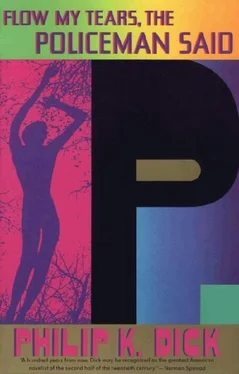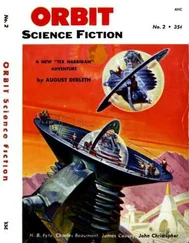“No,” Buckman said. “And it hasn’t happened this time. Somewhere, some obscure place, he’s overlooked a microdocument of a minor nature. We’ll keep searching until we find it. Sooner or later we’ll match up a voiceprint or an EEG print and then we’ll know who he really is.”
“Maybe he’s exactly who he says he is.” Alys had been examining McNulty’s grotesque notes. “Subject belongs to musicians’ union. Says he’s a singer. Maybe a voiceprint would be your—”
“Get out of my office,” Buckman said to her
“I’m just speculating. Maybe he recorded that new pornochord hit, ‘Go Down, Moses’ that—”
“I’ll tell you what,” Buckman said. “Go home and look in the study, in a glassine envelope in the center drawer of my maple desk. You’ll find a lightly canceled perfectly centered copy of the one-dollar black U.S. Trans-Mississippi issue. I got it for my own collection but you can have it for yours; I’ll get another. Just go . Go and get the damn stamp and put it away in your album in your safe forever. Don’t ever even look at it again; just have it. And leave me alone at work. Is that a deal?”
“Jesus,” Alys said, her eyes alive with light. “Where’d you get it?”
“From a political prisoner on his way to a forced-labor camp. He traded it for his freedom. I thought it was an equitable arrangement. Don’t you?”
Alys said, “The most beautifully engraved stamp ever issued. At any time. By any country.”
“Do you want it?” he said.
“Yes.” She moved from the office, out into the corridor. “I’ll see you tomorrow. But you don’t have to give me something like that to make me go; I want to go home and take a shower and change my clothes and go to bed for a few hours. On the other hand, if you want to—”
“I want to,” Buckman said, and to himself he added, Because I’m so goddamn afraid of you, so basically, ontologically scared of everything about you, even your willingness to leave. I’m even afraid of that!
Why? he asked himself as he watched her head for the secluded prison ascent tube at the far end of his suite of offices. I’ve known her as a child and I feared her then. Because, I think, in some fundamental way that I don’t comprehend, she doesn’t play by the rules. We all have rules; they differ, but we all play by them. For example, he conjectured, we don’t murder a man who has just done us a favor. Even in this, a police state—even we observe that rule. And we don’t deliberately destroy objects precious to us. But Alys is capable of going home, finding the one-dollar black, and setting fire to it with her cigarette. I know that and yet I gave it to her; I’m still praying that underneath or eventually or whatever she’ll come back and shoot marbles the way the rest of us do.
But she never will.
He thought, And the reason I offered her the one-dollar black was because, simply, I hoped to beguile her, tempt her, into returning to rules that we can understand. Rules the rest of us can apply. I’m bribing her, and it’s a waste of time—if not much much more—and I know it and she knows it. Yes, he thought. She probably will set fire to the one-dollar black, the finest stamp ever issued, a philatelic item I have never seen for sale during my lifetime. Even at auctions. And when I get home tonight she’ll show me the ashes. Maybe she’ll leave a corner of it unburned, to prove she really did it.
And I’ll believe it. And I’ll be even more afraid.
Moodily, General Buckman opened the third drawer of the large desk and placed a tape-reel in the small transport he kept there. Dowland aires for four voices… he stood listening to one which he enjoyed very much, among all the songs in Dowland’s lute books.
…For now left and forlorn
I sit, I sigh, I weep, I faint, I die
In deadly pain and endless misery.
The first man, Buckman mused, to write a piece of abstract music. He removed the tape, put in the lute one, and stood listening to the “Lachrimae Antiquae Pavan.” From this, he said to himself, came, at last, the Beethoven final quartets. And everything else. Except for Wagner.
He detested Wagner. Wagner and those like him, such as Berlioz, had set music back three centuries. Until Karlheinz Stockhausen in his “Gesang der Junglinge” had once more brought music up to date.
Standing by the desk, he gazed down for a moment at the recent 4-D photo of Jason Taverner—the photograph taken by Katharine Nelson. What a damn good-looking man, he thought. Almost professionally good-looking. Well, he’s a singer; it fits. He’s in show business.
Touching the 4-D photo, he listened to it say, “How now, brown cow?” And smiled. And, listening once more to the “Lachrimae Antiquae Pavan,” thought:
Flow, my tears …
Do I really have pol-karma? he asked himself. Loving words and music like this? Yes, he thought, I make a superb pol because I don’t think like a pol . I don’t, for example, think like McNulty, who will always be—what did they used to say?—a pig all his life. I think, not like the people we’re trying to apprehend, but like the important people we’re trying to apprehend. Like this man, he thought, this Jason Taverner. I have a hunch, an irrational but beautifully functional intuition, that he’s still in Vegas. We will trap him there, and not where McNulty thinks: rationally and logically somewhere farther on.
I am like Byron, he thought, fighting for freedom, giving up his life to fight for Greece. Except that I am not fighting for freedom; I am fighting for a coherent society.
Is that actually true? he asked himself. Is that why I do what I do? To create order, structure, harmony? Rules. Yes, he thought; rules are goddamn important to me, and that is why Alys threatens me; that’s why I can cope with so much else but not with her.
Thank God they’re not all like her, he said to himself. Thank God, in fact, that she’s one of a kind.
Pressing a button on his desk intercom he said, “Herb, will you come in here, please?”
Herbert Maime entered the office, a stack of computer cards in his hands; he looked harried.
“You want to buy a bet, Herb?” Buckman said. “That Jason Taverner is in Las Vegas?”
“Why are you concerning yourself with such a funky little chickenshit matter?” Herb said. “It’s on McNulty’s level, not yours.”
Seating himself, Buckman began an idle colortone game with the picphone; he flashed the flags of various extinct nations. “Look at what this man has done. Somehow he’s managed to get all data pertaining to him out of every data bank on the planet and the lunar and Martian colonies … McNulty even tried there. Think for a minute what it would take to do that. Money? Huge sums. Bribes. Astronomical. If Taverner has used that kind of heavy bread he’s playing for big stakes. Influence? Same conclusion: he’s got a lot of power and we must consider him a major figure. It’s who he represents that concerns me most; I think some group, somewhere on earth, is backing him, but I have no idea what for or why. All right; so they expunge all data concerning him; Jason Taverner is the man who doesn’t exist. But, having done that, what have they achieved?”
Herb pondered.
“I can’t make it out,” Buckman said. “It has no sense to it. But, if they’re interested in doing it, it must signify something. Otherwise, they wouldn’t expend so much”—he gestured—“whatever they’ve expended. Money, time, influence, whatever. Maybe all three. Plus large slabs of effort.”
“I see,” Herb said, nodding.
Buckman said, “Sometimes you catch big fish by hooking one small fish. That’s what you never know: will the next small fish you catch be the link with something giant or”—he shrugged—“just more small fry to be tossed into the labor pool. Which, perhaps, is all Jason Taverner is. I may be completely wrong. But I’m interested.”
Читать дальше









